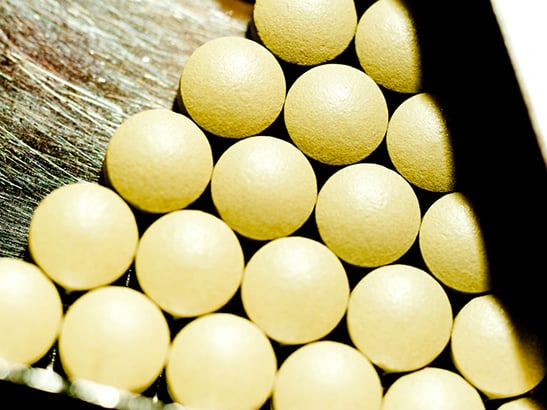
Drugs that target a ‘crutch’ used by cancer cells to keep on dividing and growing could help treat a range of cancer types, researchers have found.
The scientists, from The Institute of Cancer Research, London, found that blocking the action of a protein called cyclin G associated kinase (GAK) killed cancer cells with faulty versions of a gene called FBXW7.
Loss of FBXW7 functionality results in the stabilisation of multiple major proteins that drive cancer, culminating in increased cellular proliferation and pro-survival pathways, cell cycle deregulation, chromosomal instability and altered metabolism.
But cancer cells with faulty FBXW7 use GAK as a crutch, the study showed – becoming reliant on it in the absence of FBXW7 to keep on dividing and growing.
Possible treatment for a wide range of tumours
In the study, published in the British Journal of Cancer, the researchers systematically removed genes from bowel or breast cancer cells that lacked FBXW7. They were looking for other genes that were necessary for the survival of these cells, which might be the targets for future drugs.
When the team knocked out GAK from the cancer cells, 85–90% of cells with a faulty FBXW7 died within two weeks – while more than 90% of cells with functioning copies of FBXW7 survived.
The study shows that designing drugs that target GAK could prove to be an effective treatment for patients with a wide range of tumours that commonly contain FBXW7 mutations, such as bile duct, colon, breast and stomach cancers.
Targeting GAK would only kill cells with a faulty FBXW7 gene, exploiting a concept called ‘synthetic lethality’ – when cancer cells gather faults in anti-cancer proteins in order to fuel tumour growth, but become overly reliant on other proteins to survive.
Like other synthetically lethal drugs – such as PARP inhibitors – a drug that targets GAK in FBXW7-mutated tumours could spare healthy cells, reducing side effects compared to other types of chemotherapy.
Search is our twice-yearly newsletter to supporters. Read our latest news, recent research achievements and interviews with our world-leading scientists and clinicians.
The study was funded by Cancer Research UK and Breast Cancer Now.
Professor Spiros Linardopoulos, Team Leader in Target Discovery and Apoptosis at the ICR, said:
“Cancer cells with a faulty FBXW7 gene have difficulty lining up their DNA for cell division and depend heavily on GAK as a crutch to continue growing. We know that FBXW7 deficiency drives many tumours – the gene is mutated in about a third of cancers, and is often associated with poor prognosis.
“There are no existing drugs that block GAK – but if one can be developed, it could kick away this crutch and selectively take out these tumours.”
